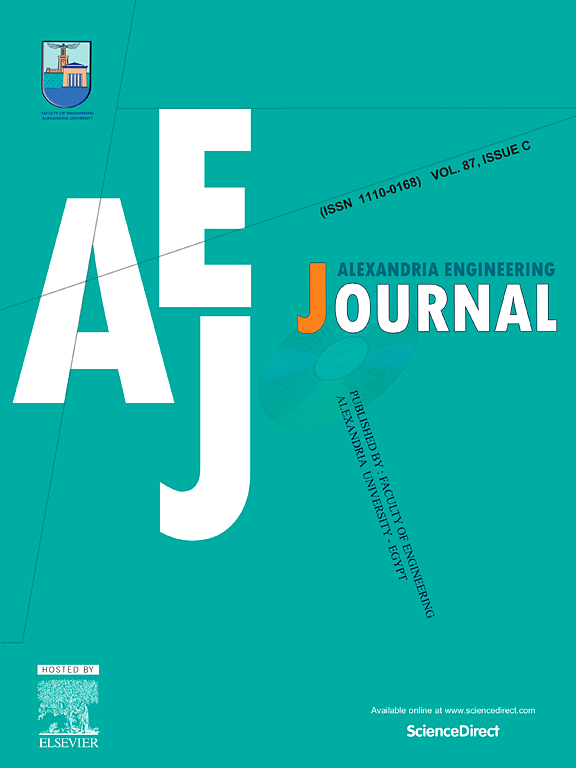混沌多策略自适应海象优化器的全局优化和特征选择
IF 6.8
2区 工程技术
Q1 ENGINEERING, MULTIDISCIPLINARY
引用次数: 0
摘要
海象优化器(WO)是一种模拟海象行为的元启发式算法。然而,对WO参数的修改会影响结果的一致性。最终,该算法被约束于局部解,因为最小化边界可能导致解重叠。为了解决WO的缺点,WO的提议版本引入了多策略海象优化器(MSWO),这是WO的一个集成版本,具有几个有目的的策略。其中包括混沌算子策略、自适应策略、引入微小随机变化的突变策略、动态边界定位微调整策略等。首先,一个有希望的混沌映射扩展了搜索空间并提供了多样性,作为混沌方法的一部分,用于阻止WO在优化的早期阶段收敛。其次,使用自适应技术解决了WO参数变化引起的不稳定性。为了增强基本WO的种群多样性,采用线性缩放方法修改搜索代理在动态边界内的位置。动态学习过程的目的是提高搜索代理适应搜索空间中位置变化的能力。最后,为了提高MSWO的速度并帮助其摆脱局部最优,采用了高斯突变策略,该策略使用高斯分布来确定这些变化的大小和方向。在评估研究中,使用CEC2019和CEC2020基准测试函数验证了所提出的MSWO算法的性能。然后,将所提出的MSWO算法用于解决五个常规工程问题,以证明其对现实问题的可靠性和适用性。此外,还使用了一些特征选择(FS)问题来评估MSWO对具有挑战性的现实优化问题的适用性。评价实验结果表明,本文提出的MSWO算法性能优于基本WO方法和其他知名算法。本文章由计算机程序翻译,如有差异,请以英文原文为准。
Chaotic multi-strategy adaptive walrus optimizer for global optimization and feature selection
The walrus optimizer (WO) is a new meta-heuristic algorithm designed to mimic the behaviors of oceanic walruses. However, the consistency of the results is impacted by modifications to the WO parameters. Eventually, the algorithm becomes constrained to local solutions, because minimizing the boundary is likely to lead to overlapping solutions. To address WO’s shortcomings, the proposed version of WO introduces the multi-strategy walrus optimizer (MSWO), an integrated version of WO with several purposeful strategies. Chaotic operator strategy, adaptive strategy, mutation strategy that introduces slight random changes to the search agents, and dynamic boundary location micro-adjustment strategy are some of these purposed strategies. First, a promising chaotic map that expands the search space and provides diversity is used as part of a chaotic approach to stop WO from converging in the early phases of optimization. Second, instability caused by changes in WO parameters is addressed using an adaptive technique. To enhance the population variety of the basic WO, a linear scaling approach is then applied to modify the search agents’ positions inside the dynamic border. The purpose of the dynamic learning procedure is to improve the ability of search agents to adapt to changing locations in the search space. Finally, to improve the speed of MSWO and help it break out of local optimums, a Gaussian mutation strategy is included, which determines the size and direction of these changes using a Gaussian distribution. In evaluation studies, the performance of the proposed MSWO algorithm was confirmed using the CEC2019 and CEC2020 benchmark test functions. The proposed MSWO algorithm was then used to address five conventional engineering problems to demonstrate its dependability and suitability for real-world problems. Furthermore, a few feature selection (FS) problems were used to assess MSWO’s applicability to challenging real-world optimization problems. The results of the evaluation experiments show that the proposed MSWO algorithm performs better than the basic WO method and other well-known algorithms.
求助全文
通过发布文献求助,成功后即可免费获取论文全文。
去求助
来源期刊

alexandria engineering journal
Engineering-General Engineering
CiteScore
11.20
自引率
4.40%
发文量
1015
审稿时长
43 days
期刊介绍:
Alexandria Engineering Journal is an international journal devoted to publishing high quality papers in the field of engineering and applied science. Alexandria Engineering Journal is cited in the Engineering Information Services (EIS) and the Chemical Abstracts (CA). The papers published in Alexandria Engineering Journal are grouped into five sections, according to the following classification:
• Mechanical, Production, Marine and Textile Engineering
• Electrical Engineering, Computer Science and Nuclear Engineering
• Civil and Architecture Engineering
• Chemical Engineering and Applied Sciences
• Environmental Engineering
 求助内容:
求助内容: 应助结果提醒方式:
应助结果提醒方式:


